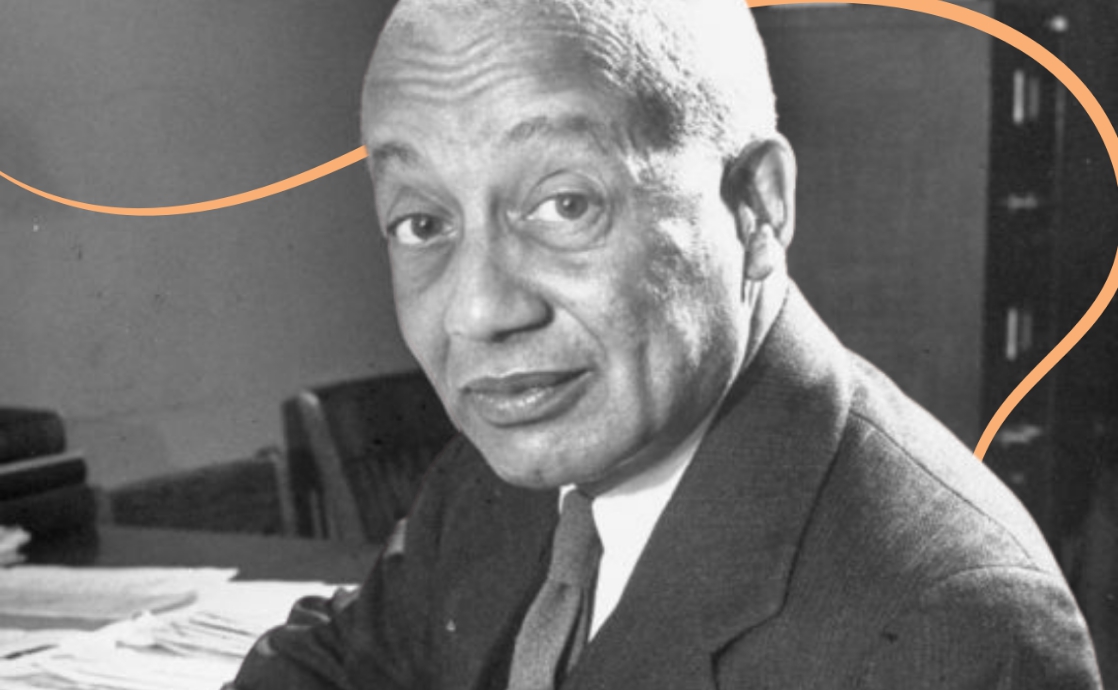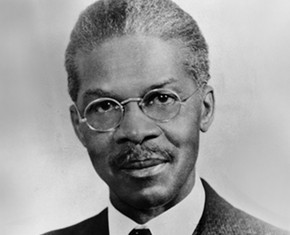The views expressed in our content reflect individual perspectives and do not represent the authoritative views of the Baha'i Faith.
What did the intellectual architect of the Harlem Renaissance, the influential Black philosopher, writer, and teacher Alain Locke, have to say in public about the Baha’i Faith during the last years of his life?
Certainly Dr. Locke, the first African American Rhodes Scholar and famed exponent of cultural pluralism, wrote about the Baha’i teachings often in his many contributions to Baha’i literature. For example, in his essay “Unity Through Diversity: A Baha’i Principle,” from Volume 4 of The Baha’i World, Dr. Locke wrote:
Each period of a faith imposes a special new problem. Is it too much to assume that for us the problem of this particular critical decade is just this task of transposing the traditional Baha’i reciprocity between religions into the social and cultural denominationalisms of nation, race and class, and vindicating anew upon this plane the precious legacy of the inspired teachings of Abdu’l-Baha and Baha’u’llah? Certainly that is my reverent conviction and my humble suggestion.
RELATED: Alain Locke: African American Icon
Those inspired Baha’i teachings Locke referred to regarding the reciprocity between religions are exemplified by this passage from one of Abdu’l-Baha’s speeches given in North America in 1912:
The supreme need of humanity is cooperation and reciprocity. The stronger the ties of fellowship and solidarity amongst men, the greater will be the power of constructiveness and accomplishment in all the planes of human activity. Without cooperation and reciprocal attitude the individual member of human society remains self-centered, uninspired by altruistic purposes, limited and solitary in development like the animal and plant organisms of the lower kingdoms. … Therefore, every cooperative attitude and activity of human life is praiseworthy and foreintended by the will of God.
Despite Dr. Locke’s writings regarding his religion, we have few records of Alain Locke’s public talks about the Baha’i Faith – but a first-person recollection which came to light comparatively recently (decades after Locke’s death) deserves further attention.
In this two-part series of essays, Baha’i scholar and author Christopher Buck interviews Michael Rochester, former member of the National Spiritual Assembly of the Baha’is of Canada and Professor Emeritus of Physics and Earth Sciences at Memorial University of Newfoundland, about Alain Locke’s talk at a Baha’i fireside in Toronto, on Sunday, March 23, 1952, when Dr. Rochester was a young man of 19 who had not yet embraced the Baha’i Faith.
Q: Greetings, Dr. Rochester! This is what I wrote about you in my 2005 book, Alain Locke: Faith & Philosophy:
Fireside in Toronto: … Locke’s last-known speaking engagement at a Baha’i-sponsored event came to light when Michael Rochester … sent me the following e-mail message:
I have just scanned your [2002] article on Alain Locke [“Alain Locke: Baha’i Philosopher”] in the just-arrived Baha’i Studies Review v. 10, and look forward to reading it more thoroughly. But I noticed, and was intrigued by, your description of his withdrawal, at least for a decade or so in the latter part of his life, from “active involvement in” the Baha’i community, and his having later “publicly identified himself as a Baha’i … as late as 1952” [quoting Buck’s 2002 article].
A personal recollection of Alain Locke near the end of his life may be of interest to you.
Having been strongly attracted to the Baha’i teachings in November 1951, as a student at the University of Toronto, I vividly remember attending a fireside held in January or February 1952, in a home in what was then a suburb of Toronto, at which Alain Locke was the speaker. Unfortunately Elizabeth Manser (later my wife) who organized that fireside, no longer remembers how Dr. Locke came to be in Toronto, to be invited to the fireside or the title of his talk. His persona made a great impression on me, not only because what I understood of the Baha’i stand on the oneness of the human race and the importance of efforts to free ourselves from racial prejudice was immensely attractive to me, but because his modest demeanor, and the wisdom and thoughtfulness with which he expressed himself, were so consonant with what I had already come to appreciate in and expect from the best Baha’i speakers. He certainly clearly identified himself – indeed was introduced – as a Baha’i to all of us there, Baha’is and seekers.
I spoke with him briefly after his talk, but sadly no memory now remains of what we talked about. I do remember how excited I was, a few months later, to find an article by him in a Random House anthology of American Negro literature. It was not until a few years later (after his death), when my wife and I acquired all the earlier Baha’i World volumes, that I discovered and relished his articles there. I have always felt privileged to have met and talked with this great but too-little-remembered figure in American intellectual history, this wise and fine Baha’i.
With best wishes,
Michael Rochester
Elizabeth Rochester distinctly remembers that Locke spoke at her fireside – an informational meeting intended to introduce new people to the Baha’i teachings – on Sunday, 23 March 1952, because it was her birthday. From 1949–1953, Elizabeth, together with her mother Jessie Harkness Manser, hosted very successful firesides in their apartment in Forest Hill Village, where they had lived since 1940.
Neither Michael nor Elizabeth can recall just how she and her mother discovered that Locke would be in Canada, or how they contacted Locke to invite him to give his talk at that fireside.
As late as 1952, therefore – two years before his passing – we have evidence that Locke continued to identify himself as a Baha’i. So, 16 years later — and 69 years after Alain Locke’s last-known Baha’i speaking event — I have a few follow-up questions to ask, if I may. As attorneys often ask witnesses, “Does this refresh your memory?” If so, please let our readers know, Dr. Rochester, if you have any added recollections of Alain Locke’s March 23, 1952 Baha’i fireside in Toronto.
A: The Sunday evening fireside organized by Elizabeth Manser was only once not held at the apartment Elizabeth shared with her mother. That occasion was 23 March 1952 (which happened to be Elizabeth’s 22nd birthday), when Janet Strathdee, a young woman who had been attending those firesides, hosted it in the home of the Firestone family in Forest Hill village (then a separate municipality bordering Toronto), whose children Janet cared for.
RELATED: Sing the Ballad of Alain Locke—Burying the Black Plato
The speaker was Dr. Alain Locke, who must have been recommended to Elizabeth by John Robarts (appointed by Shoghi Effendi, in 1957, as a “Hand of the Cause of God,” the highest office to which an individual could be appointed in the Baha’i Faith), at whose home Elizabeth had first heard of (and immediately accepted) the Faith several years previously. John Robarts was then serving as chairman of the National Spiritual Assembly of the Baha’is of Canada.
I don’t think I ever knew just how Dr. Locke had come to be in Toronto. As he entered the Firestone living room and was introduced, I was struck by the combination of great dignity and humility in his demeanor. Unfortunately I remember almost nothing of what he said, except that he expressed strong hopes that the United Nations would help to bring about a greater unity among the peoples of the world. But I certainly had the sense that I had been privileged to be, however briefly, in the presence of a great personage.
I was 19 when I met Alain Locke. Of the others who would have attended that fireside, the only ones I can remember are Janet Strathdee and Elizabeth. I guess it’s possible we might be among the last living Baha’is to have met him, but I really have no idea. Maybe some old-timers in the New York City Baha’i community would recall having met him. So far as I was aware at the time, he was not a speaker at any other Baha’i event in the Toronto area on that visit – otherwise I would certainly have been there! I was not yet a committed Baha’i then, and only enrolled in the Faith in August of 1952.
By the way, it just occurred to me that the person who steered Locke to Elizabeth’s fireside might have been Ross Woodman, then a member of the National Spiritual Assembly of Canada and one of the most charismatic Baha’i speakers I have ever heard. He died at the age of 91 in 2014. The reason I thought of Ross is that he was a frequent visitor to New York City, and visited Baha’i artist, Juliet Thompson, in her apartment there. So he might have met Locke there.
Q: Thanks so much! This is fascinating information, and we’ll continue our interview in the next essay.

















Comments
Sign in or create an account
Continue with Googleor